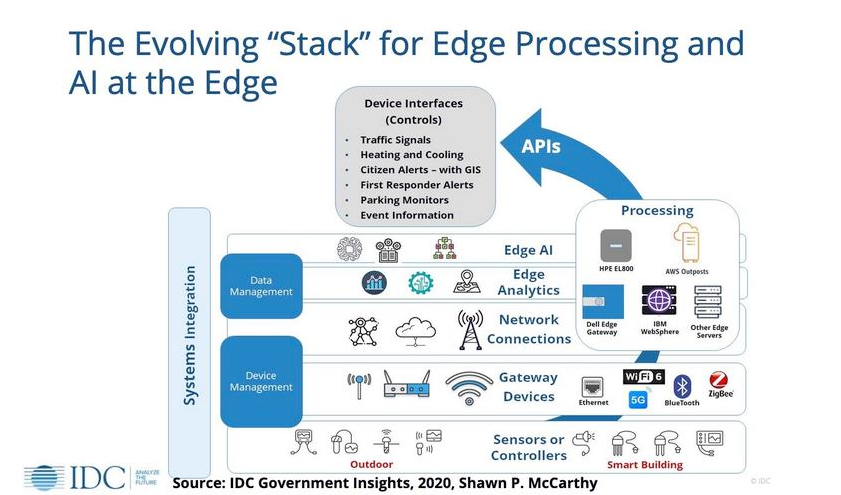
There isn’t any one-size-fits-all answer, however authorities leaders will want programs integrators to make these IoT tasks successful.
Authorities businesses managing a number of sources of Internet of Things (IoT) knowledge are almost definitely to launch edge computing tasks to economize and enhance metropolis companies, in line with an IDC authorities analyst.
Shawn P. McCarthy, analysis director for IDC Authorities Insights, predicts that native governments and the army will prepared the ground in adopting artificial intelligence (AI) to scale back fraud, enhance companies, and enhance compliance. McCarty mentioned these predictions in addition to the present market throughout a webinar, “Edge Computing, 5G & AI: Authorities’s Exponential Excellent Storm.”
“Integrating this knowledge can get monetary savings, and that is the place you are going to see many of the development occur,” he stated.
The advantages of distributed AI are a optimistic return on funding, decrease prices, centered efficiencies and data-driven choice making, however the required processing energy is a big problem, he added.
Synthetic intelligence is already bettering authorities operations from fine-tuning upkeep schedules for Air Pressure planes to lowering pedestrian deaths on metropolis streets. Different use circumstances for edge computing and IoT tasks embrace:
- Monitoring river circulate ranges
- Optimizing constructing temperature by adjusting AC and venting
- Bettering crowd management and response
- Accumulating public well being knowledge
McCarthy stated some knowledge evaluation should be completed on the edge to get the good thing about real-time evaluation.
“When processing is completed on the knowledge middle or within the cloud, you do not achieve pace, you do not enhance agility, and you’ve got fewer choices for quick automated responses,” he stated.
He described the AI alternatives alongside the whole spectrum of IoT platform parts as “small footprint AI,” a wise system that does one job very properly, as in comparison with Alexa, an AI system that has many capabilities.
Nobody-size-fits-all answer
IDC’s World IoT Determination Maker Survey 2019 discovered that federal authorities businesses are doing probably the most edge computing with about 25% of all IoT knowledge collected and processed on the edge. Cities have probably the most edge-based computation necessities and course of about 20% of the information collected on the edge. States and territories are lagging on this space however additionally they do not need to be outfront as a result of they aren’t amassing the information. Throughout federal, state, and native governments, most knowledge is processed by means of a hybrid mannequin with some processed on the edge and the remainder despatched to a knowledge middle.
Due to the complexity of the programs that these entities are managing, metropolis managers will want programs integrators to make these tasks successful.
McCarthy additionally shared these main IoT traits throughout all industries:
- Platforms will grow to be extra verticalized with an elevated concentrate on the use case as a substitute of common objective choices.
- Edge computing will grow to be extra essential as a result of want for real-time perception, value discount, and elevated safety.
- Safety and privateness will proceed to be the highest knowledge administration considerations as bettering knowledge sharing and governance.
- Authorities businesses will want a specialised programs integrator to handle complicated multi-vendor deployments and infrastructure modernization.
McCarthy stated progress in edge computing is transferring at completely different charges throughout completely different ranges of presidency, reinforcing the concept that there isn’t a one-size-fits-all answer.
“The very best development alternatives are at businesses with multi-structured knowledge sources that can be utilized to create new options, construct higher companies, and optimize operations,” he stated.
To make the case for IoT investments, metropolis leaders ought to decide whether or not the challenge might cut back present IT prices and whether or not the options might enhance service ranges to residents.
McCarthy additionally urged this record of questions for presidency businesses attempting to determine get began with IoT tasks:
- What knowledge lives inside present amenities, and what knowledge would you like that exists at different places?
- How a lot knowledge is there, and how briskly is it rising?
- How a lot time does it take for these knowledge collections to traverse the community?
- What extra knowledge sources do you propose so as to add?
- Will the amount of the brand new knowledge make it essential to maneuver processing energy out into the community?
- Are you able to do your evaluation and make choices close to the place the information lives?
- Is distributed processing wanted at a number of places?
- Is the information saved in a method that makes it simply obtainable for AI and machine studying or is secondary knowledge prep wanted?
- Are you not utilizing a few of the knowledge that may in any other case be helpful to avoid wasting time effort and community stress?
Understanding these points is a serious step towards deciding if distributed AI is required, he added.
Good Cities and IoT E-newsletter
Keep knowledgeable about good cities tech, which incorporates improvements in IoT, 5G, safety, knowledge analytics, cell apps, and extra.
Support Ukraine against russian fascists! Defend Europe from horde! Glory to Ukraine! 🇺🇦

Head and Editor in Chief of EcmaScript2017 Journal. Senior JS Back-end Full stack developer and software architect.



Read Also
Why DevOps Managed Services Have Become More Popular and Important
M4uHD: Unveiling the Entertainment or Venturing into Uncertainty?
Smart Square HMH: Access, Features, Pros, Cons